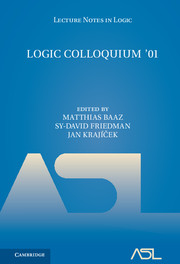Book contents
- Frontmatter
- Preface
- Contents
- TUTORIALS
- ARTICLES
- Modified bar recursion and classical dependent choice
- Choice and uniformity in weak applicative theories
- Compactness and incompactness phenomena in set theory
- Selection for Borel relations
- Interpolation in goal-directed proof systems 1
- Sequences of degrees associated with models of arithmetic
- The limit theory of generic polynomials
- Moschovakis's notion of meaning as applied to linguistics
- Tameness in expansions of the real field
- The model theory of compact complex spaces
- “Natural” representations and extensions of Gödel's second theorem 350
- Effective Hausdorff dimension
- Mutual stationarity in the coremodel
- The pair (Nn, N0) may fail N0-compactness
- Incompleteness theoremand its frontier
- Groups in Simple Theories
Incompleteness theoremand its frontier
from ARTICLES
Published online by Cambridge University Press: 31 March 2017
- Frontmatter
- Preface
- Contents
- TUTORIALS
- ARTICLES
- Modified bar recursion and classical dependent choice
- Choice and uniformity in weak applicative theories
- Compactness and incompactness phenomena in set theory
- Selection for Borel relations
- Interpolation in goal-directed proof systems 1
- Sequences of degrees associated with models of arithmetic
- The limit theory of generic polynomials
- Moschovakis's notion of meaning as applied to linguistics
- Tameness in expansions of the real field
- The model theory of compact complex spaces
- “Natural” representations and extensions of Gödel's second theorem 350
- Effective Hausdorff dimension
- Mutual stationarity in the coremodel
- The pair (Nn, N0) may fail N0-compactness
- Incompleteness theoremand its frontier
- Groups in Simple Theories
Summary
As you know well, we celebrate 70th year of Gödel's “Incompleteness theorem” which he proved at the age of 25. This revolutionary theorem changed the way mathematicians think of mathematics drastically. Today, I would like to describe this theorem, its effects and expound on this subject.
Gödel's incompleteness theorem can be stated as follows.
1. Let T be a consistent axiomatic theory like set theory or the theory of analysis where Peano's arithmetic (denoted simply as arithmetic from now on) is included. Then T does not prove its consistency.
2. The consistency of T can be expressed as a sentence in arithmetic, therefore there exists an arithmetical sentence which cannot be proved in T.
This seemingly simple theorem changed our view of mathematics completely. Before this theorem, mathematicians believed that every problem in arithmetic could be solved by some stronger theory, e.g., set theory. But the Incompleteness theorem tells us that whatever stronger theory we use, there exists a true arithmetical sentence which cannot be proved in the theory.
After the Incompleteness theorem, the consistency statement becomes a landmark for the boundary of provable statements in the theory. Whenever we wish to show that the theory T is strictly stronger than the theory T, we first try to show that the theory T proves the consistency statement of T. In this way we can show that the theory of analysis is strictly stronger than the theory of arithmetic and that set theory is strictly stronger than the theory of analysis.
I would now like to speak of the impact that this theorem had on Hilbert's program. Hilbert was a genius to think of problems in a general setting, to find the essence of the problem and solve it. So, he was a leader of the movement of abstract systematic development and axiomatization in the 20th century mathematics. Cantor's set theory gave the ideal framework for this movement. Hilbert believed Cantor had created a new paradise for mathematicians. So, paradoxes of Cantor's set theory came as a great shock to him. Hilbert tried to save themodernmathematics and proposed the following program.
- Type
- Chapter
- Information
- Logic Colloquium '01 , pp. 434 - 439Publisher: Cambridge University PressPrint publication year: 2005

